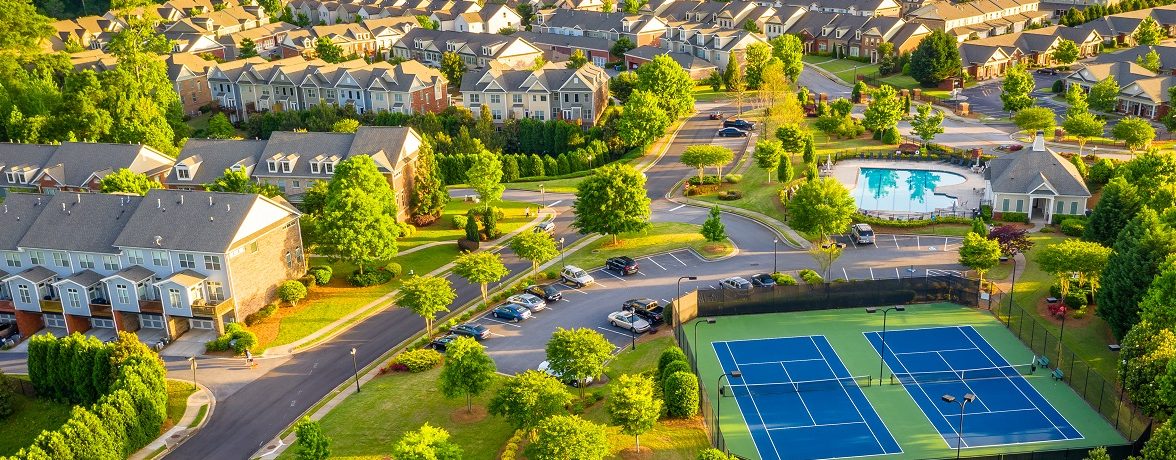Launching Your Virginia HOA
Better Solutions for Virginia HOAs
It might be a surprise to many that the state of Virginia is enjoying strong population growth. It's surpassed 8.7 million people.
That's not all. It ranks as the 12th highest state in the nation for community associations. 9,100 associations are active housing more than 2 million people in 800,000 households.
More than 16,000 new residents moved in during the July 2022 to July 2023 period. That's a .4% growth rate which was 8th in the nation. Virginia has a good income profile too boasting an average income of $72,800 per person. This enables more association revenue for providing better services, and amenities, and protecting home values which now average $413,000.

This formation of so many new HOAs is typical of the entire southeast region from North Carolina down to Florida. Neighboring South Carolina, Kentucky, West Virginia, and Georgia all offer a unique culture and close-knit communities that Northerners and California residents may not have experienced. It's a delightful culture shock for all who come to Virginia.
Virginia is a Beautiful place, for Lovers!
This state's amazing Appalachian mountains and rolling hills, seascapes, oceanfront canals, and cities rich in history, character and culture give it a special allure to a lot of people. That's contributed to a strong tourism industry. This state's annual GDP is approaching $600 billion and it highlights a promising future.
"Virginia is the leading producer of seafood in the Atlantic Coast. The largest seafood harvest in this state includes clams, blue crabs, oysters, and scallops. Virginia exports seafood to Hong Kong, Canada, and France, among other destinations. The vineyard and wineries along the Blue-Ridge Mountain and Northern Neck attracted over 2.3 million tourists in 2015 alone. Virginia had the fifth-highest number of wineries in the U.S. in 2014." -- World Atlas.
Virginia has plenty of right-sized cities where kids can grow up healthy and where the commute to work is reasonable. Richmond, Charlottesville, Roanoke, Virginia Beach, Chesapeake, Norfolk and Alexandria are the few to mention.
There is little doubt that of the 9100 HOAs and community associations operating in Virginia, most need to upgrade their software to meet the new demands of modern residents, business demands, and the laws applied to association management in the state.
Today, we look at the matter of Virginia housing developers beginning the process of handing over management of their communities to volunteer-run boards and for new communities forming to capture the advantages of being in an HOA.
Let's Appreciate Virginia HOAs and their Managers
 First things first. If there is no respect for HOA boards and management staff, with the effort and care they put into their jobs, then the choice of software is a moot point. If residents and boards care, then managers will be given the tools they need to do a fantastic job of managing these wonderful places to live.
First things first. If there is no respect for HOA boards and management staff, with the effort and care they put into their jobs, then the choice of software is a moot point. If residents and boards care, then managers will be given the tools they need to do a fantastic job of managing these wonderful places to live.
Appreciated managers and board members are more confident, dedicated, and provide better service to all stakeholders and constituents. And in a caring state like Virginia, we'd expect no less.
In this sense, launching an HOA in Tennessee is similar to one in South Carolina, North Carolina, or Florida. The HOA is understood to be a business that needs professional management and must meet unique legal standards of operation in each state. Failing in that means budget issues, legal charges, lawsuits, financial loss, and higher insurance rates.
Bad HOA Management has a High Cost
The search is on for good HOA managers, yet good managers today have powerful software platforms to work with. So when you're vetting for a new HOA manager if you self-manage, or whether hiring an HOA management company, you're really hiring great software.
The resident volume, service demands, legal requirements and budget restrictions can't be handled manually by humans. The homeowner management software speeds up, optimizes and even automates workflows. That's how association work gets done today.
If you're a housing developer, you may have been waiting for the right time to hand the community amenities and services over to a non-profit organization of volunteer residents. And who will manage it and why will they manage it well?
Your role as an advisor will get them launched correctly -- by demonstrating a high-quality SaaS powered hoa management software platform to them before you transfer the management rights to them.
Note: An HOA management platform, such as ManageCasa™ is an integrated suite of applications to take control of building and maintenance operations, payments, finances and accounting, compliance and enforcement, communications, and resident relations.
What Will a Professional Level Platform do for You?
- provide better management of the community assets and services, many of which are not provided by local government
- provide improved security and safety
- helps conduct security to discourage bad behavior of some residents and lower property crime
- protects the value of homes in the neighborhoods
- add lifestyle value in building and maintaining enjoyable amenities, landscapes, parks, roadways
- manages the cash flow to stay viable
- access useful analytics for budget planning and to foresee risks and future costs
Without efficient, comprehensive tools to manage, your association will become insolvent, possibly resulting in massive assessments and association dues that could force residents to sell their homes.
And across America, this is happening. And there are lawsuits.
Virginia Association Management Guidelines
Virginia's Property Owners' Association Act sets out the legal requirements, ensuring proper formation, registration, and operation of a Common Interest Community.
Each HOA or POA must comply with Virginia's laws, including its bylaws and a declaration document which formalizes the establishment of the homeowners association, detailing each party's rights and responsibilities. These (CC&Rs) rules include covenants, conditions, and restrictions that regulate the use of property and common areas, along with access to association records. The CC&Rs of the HOA guide all decisions the board makes and how the management team resolves issues or takes action.
How to Launch Your HOA in Virginia?
Here are some steps in the creation process, which are generally the same regardless of which state you're in:
- decide on the purpose of your organization and give it a name
- review the state laws
- determine your funding and operational needs -- establish your budget
- get resident's feedback and gauge their willingness to join/cooperate
- communicate your HOA plan to all stakeholders
- build your plan for the HOA and community
- write your CC&Rs
- determine HOA or association fees
- form your corporation's legal entity
- contact a lawyer for advice on all legal documents and processes, including transferring the association to the community, buying and selling of common areas, buildings and following due process
- create governing bylaws and rules and regulations
- elect your board members
- purchase HOA software and build a community portal
- acquire HOA insurance for property and liability
- hire a property manager
Learn more about Tennessee HOAs, North Carolina HOAs and South Carolina HOAs, and about HOA software that can handle the demands of each state.
Manage your New Virginia HOA Professionally
When researching and building your new Virginia homeowners association, a review of ManageCasa's association management platform can be very helpful.
A real, hands-on view of ManageCasa's essential services of accounting, online payments, communications, and daily management of HOA operations and maintenance is practical insight into what your management team will be managing with.
Our HOA software is a foundation for your entire HOA/CAM success. It's more than just streamlining automation, HOA efficiency and legal compliance. It's a suite of services to optimize finances, communications, and support services.
Switching to ManageCasa™ is easy. Begin with best HOA management platform and never worry about what's coming.


